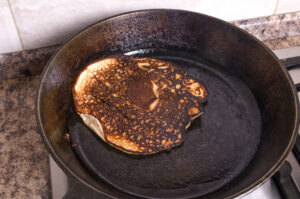The first pancake always fails
This week my Anglican and Catholic friends on social media have been reminding me it is Shrove Tuesday and Ash Wednesday. I’m not very good at following the church calendar but I am a keen self-taught cook. As such I learned a key principle in the making of pancakes.

I do not know why this is the case, but my repeated empirical research suggests this is a robust principle of cooking… and by extension of life… and business practise.
Let me explain. All my professional life I have been involved in the innovation, expansion, growth – and sustainability – of businesses and social enterprise start-ups. I’ve also advised a large number of social purpose organisations on scaling up and replicating their businesses.
The Shaftesbury Partnership, too, has been playing a leading role in the social franchising movement for over a decade now.
The initial inquiry we get, in this regard, is often the same: “Our stakeholders and supporters love what we do, we want to grow, but our model is inherently local. What are our options?”
The best response is to look at the commercial process known as franchising.
Most often, this makes us think of the large food franchises such as McDonald’s, but this is a very limited perspective of a large and multifaceted business model. For social purpose organisations the aim is to harness local social capital with a proven operational model to deliver consistent high-quality results to their community at relatively low financial cost – and more importantly without experiencing the risks encountered by all start-ups. One of the most well-known examples is the Trussell trust food bank network – who are our very good friends.
What does this have to do with pancakes?
The problem with successful franchises is we never see how they get to be successful. We just see the finished results. Digging deeper, we learn that their pathway to success was full of failures. In particular, the first efforts at replication – to establish a second operation – nearly always fail. But rather than giving up, successful franchises use this failure as a learning opportunity.
Although the specific issues vary widely, there is frequently one consistent underlying principle – the model is too complicated.
Successful franchisors learn what the essence of the business proposition is, strip out all the extras that they love but don’t need, and boil down the proposition to the source code that is fundamental to its success. Armed with that source code, they are then able to help third parties (the franchisees) to set up their own local operations, using all the skill and local know how that they have, but now de-risked through the development of this source code.
All entrepreneurs have well-developed egos. To take the risk in starting something up requires self-belief. In my mentoring and consultancy work, I need to find a way of working with that ego rather than confronting it. I have found that the combination of personal experience, the literature of franchising, and the analogy of pancakes has proved to be an effective way of shifting the conversation from failure, to learning the difference between “nice” and “necessary”. More importantly, it prepares the entrepreneur for inevitable disappointing experiences.
I recently came across the following slogan that seems to summarise the difference between those that are able to deliver impact scale, and those that give up. It’s a good place to pause…
Success is the ability to go from one failure
to another
with no loss of enthusiasm
